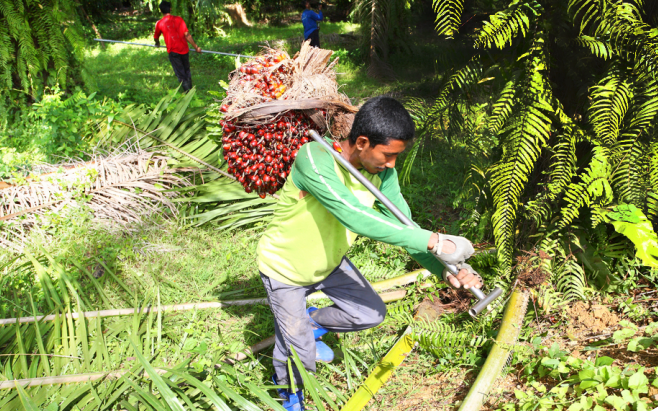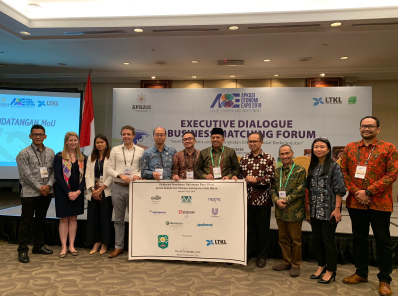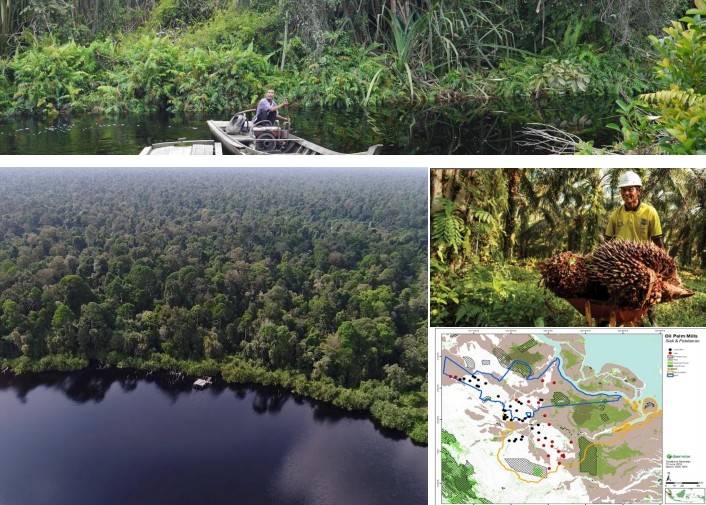Resources
The potential Role of Labor Unions in Advocating for Casual Daily Workers’ Rights
In palm oil plantations, 50-70% of workers are typically casual workers who face significant vulnerabilities due to their lack of contractual status. Because they are not formally employed, they cannot join trade unions, leaving them without representation. This research, a collaboration between CNV Internationaal and SPLP, focuses on how trade unions can advocate for and support casual workers despite these challenges.
Setting up and strengthening gender committees in the palm oil sector
Gender committees are typically established to oversee organisational initiatives promoting gender equality and women’s empowerment in the workplace. However, in Indonesia, they are often misperceived as women-only organisations focused on social gatherings and healthcare check-ups. This study, a collaboration between CNV Internationaal and SPLP, aims to clarify the actual role of gender committees, provide guidance on how to establish them, and highlight best practices based on Siak Pelalawan Landscape Program (SPLP) interventions.
SPLP 2024 Activity Report
SPLP concluded its fifth year of implementation and prepares to embark on the 2nd phase from 2025-2028. What started with a small field team in Riau has grown into a landscape wide initiative delivering a village support programme in 52 villages, reaching 5,228 smallholders for Good Agricultural Practice (GAP) and 572 issued Plantation Registry Letter (STDB), engaging 49 mills and 10,356 mill workers, as well as supporting the increased protection by regulation to 284,579 hectares peat-forests & mangrove and rehabilitation of 106 hectares forest, all supported by a team of 31 full-time facilitators.
The new 2024 Activity Report from the Siak Pelalawan Landscape Programme can now be downloaded.
Supporting District Government in Land Tenurial Conflict Handling
Since 2023, SPLP has been supporting the Regional Administration and Land Division of the District Secretariat of Siak and Pelalawan in land tenurial conflict handling program. In addition to various capacity building activities, SPLP has produced several documentations together with the district government officers related to the tenurial conflict handling, such as land tenurial conflict mapping in Siak & Pelalawan (please contact SPLP team to access the report), capacity assessment of NGOs/CSOs in Siak, Pelalawan and the surroundings to support land tenurial conflict resolution, case study analysis (please contact SPLP team to access the report) and development of SOP (standard operational procedure) for the government officers in handling land tenurial conflicts.
Click the reports (in Indonesian) below to find out more.
2nd SPLP Field Team Video Competition
SPLP conducted a short video competition among the field staff for the second time. In total, there were 11 videos submitted. We appreciate the staff’s creativity and proudly announce the four winners. Enjoy the footage of the beautiful forests and natural ecosystems in both Siak and Pelalawan districts!
1. Alternative Economy
2. Take Care of Mangroves, Take Care of the Earth, Take Care of the Mother Earth
4. Organic Buton Compost Fertilizer
3. Good Agricultural Practices
Assessment on Enabling Carbon Project for Rawa Mekar Jaya & Teluk Lanus Village Forests
SPLP conducted an assessment on enabling a carbon project to activate potential revenue for long-term financing of sustainable forest management for Rawa Mekar Jaya & Teluk Lanus Village Forests (VF). The study assesses that potential interventions in Rawa Mekar Jaya VF will contribute to emission reduction of 9,414 tCO2eq/ year through protection of 2,779 ha secondary peat forest and through agroforestry and assisted natural regeneration on 115 ha area. The other VF, Teluk Lanus VF is quite undisturbed based on land use change analysis of 2012-2022 so there is no additionality if a carbon project is implemented in the VF. Yet, the protection of Teluk Lanus VF is important for biodiversity and climate change. The study report is written in Indonesian. Please contact SPLP team to arrange a discussion, if necessary.
Investigating Efforts to Promote Social Inclusion within Sustainable Production Landscapes in Siak and Pelalawan Districts, Indonesia
The Siak Pelalawan Landscape Program (SPLP) was selected as one of two initiatives for investigation. The study encompasses both in-depth analysis of the SPLP and a comparative analysis in which inclusion dynamics in the SPLP are compared with those in another prominent program of jurisdictional sustainability (in Sintang, West Kalimantan). By comparing jurisdictional sustainability programs in two different subnational contexts, the research aims to elicit findings regarding how both the design and implementation of jurisdictional sustainability programs, and broader patterns of social inequality in implementation sites, work together to shape, enable and constrain social inclusion.
SPLP 2023 Activity Report
The new 2023 Activity Report from the Siak Pelalawan Landscape Programme can now be downloaded.
This report provides an overview of SPLP activities conducted in 2023 and is based on the Landscape Reporting Framework (LRF). This is the third year of SPLP reporting referencing the LRF.
District Action Plan on Sustainable Palm Oil of Siak District
SPLP team closed the year of 2023 with a wonderful milestone for the landscape sustainability. Together with the Agricultural Office of Siak district, the team managed to finish the development of the district action plan on sustainable palm oil as well as have it legalized through the regent regulation.
Landscape Knowledge Exchange
The Ministry of Agriculture, Siak-Pelalawan Landscape Programme – Daemeter & Proforest, United Nations Development Programme (UNDP), State Secretariat for Economic Affairs Sustainable Landscape Programme Indonesia (SECO SLPI) and the Tropical Forest Alliance (TFA) conducted the Landscape Knowledge Exchange on 16-17 November 2023. The event aimed to provide an exchange platform for implementing agencies, donors, and companies involved in the sustainable landscape programs in Indonesia; and discuss and address challenges in implementing the landscape initiatives around land conversion free landscapes, smallholder inclusion, and stakeholder partnership.
“Manumbai”, a local wisdom in harvesting the honey of Sialang bee sustainably.
Manumbai is a procession of harvesting the honey of Sialang bee that has been carried out for many generations, especially the Petalangan community in a certain way at night. This tradition has been abandoned since a decade ago. SPLP facilitated the revival of this long abandoned local wisdom.
Winners announced in SPLP field team video competition
Here are the top-scoring videos from the SPLP teams, explaining some of the vital work they carry out from village level through to government engagement. Plus lots of footage of the beautiful forests and natural ecosystems in both Siak and Pelalawan districts.
1. Pineapple as a source of income on peatland
2. oil palm plantation and sustainable plantation
3. sustainable district
SPLP 2022 Activity Report
This report provides an overview of SPLP activities conducted in 2022, and is based on the Landscape Reporting Framework (LRF). This is the second year of SPLP reporting referencing the LRF. New in this 2022 report, we added social dialogue progress independent from the LRF as this component is not yet covered by the framework.
Shaping a social dialogue culture for more sustainable palm oil
Sustainable palm oil initiatives exist to address environmental and social issues such as exploitation in the palm oil industry. In particular, labour issues such as wages, the welfare of women workers, child labour, and workers’ safety are at the forefront. Providing a space where union representatives can discuss core issues with companies and government officials is an effective method and a key part of the process to improve the labour situation.
Why collective investment is important
Coalitions Protecting our Forests: The Consumer Goods Forum worked with BBC Storyworks to produce this video showing the importance of their members’ collective investment in the Siak Pelalawan Landscape Programme.
Landscape Monitoring Maret 2022: From the BBC’s World, to the all-important views of the people on the ground. One of our Village Facilitators made a video about their work as part of the SPLP, showing the importance of their local ownership of the programme.
report - Guidance Paper on Social Dialogue, Freedom of Association and Collective Bargaining in the palm oil sector in Indonesia (2022)
This document is developed to provide guidance to palm oil supply chain actors; producers (plantation and mills), refineries, traders, manufacturers and international consumer goods companies connected to the palm oil sector in Indonesia.
Mill engagement progress report - snapshot of 31st december 2021
One of the objectives of the Siak Pelalawan Landscape Programme (SPLP) is to support palm oil mills in the landscape to become NDPE compliant and to move to delivering in the NDPE Implementation Reporting Framework (IRF). To understand the progress the mills are making towards delivering on NDPE commitments, SPLP pools anonymised data on mill engagement. The engagement status is a proxy indicator for the progress towards delivering on NDPE commitments.
The village support programme (2022)
The past years have seen the development of coalitions of companies, with the purpose of setting up landscape programmes and to collaborate to achieve inclusive palm oil supply chains and to work beyond individual supply chains to support rural livelihoods and forest positive outcomes. In Indonesia, CORE’s experience shows that working at a village level is an effective pathway for action in landscape programmes, where supply chains are connected to the wider community which can collectively implement sustainable land use. To support this CORE is implementing the Village Support Programme.
2021 activity report
An overview of the SPLP activities conducted in 2021. The reporting is based on the Landscape Activity Metrics Framework and details are found in the SPLP interim annual report 2021. The framework is designed to be applied across landscapes and initially captures three thematic areas: 1) Natural ecosystems and biodiversity, 2) Farmers and communities and 3) Partnerships.
Siak Pelalawan Landscape programme: overview
This brief overview, produced in 2022, provides useful background information, alongside the SPLP programme goals, phases and facilitation details.
documentation: district action plan for sustainable palm oil pelalawan (2021)
District Action Plan for Sustainable Palm Oil (RAPKSB) in Pelalawan district. The District Action Plan is implemented during the period 2020-2024 and is formalized in Bupati Decree No. 73/2020. (Bahasa Indonesia)
Article: collaborative action for a ‘forest positive’ future (2020)
“While jurisdictional initiatives are still in their nascent stages, early signs are encouraging that companies are deploying these initiatives as a viable tool in addressing sourcing and sustainability challenges within their commodity supply chains. One notable example is the Siak Pelalawan Landscape Program (SPLP) in Riau, which is a coalition of eight companies – Cargill, Danone, Golden Agri-Resources, Musim Mas, Neste, PepsiCo, Unilever and L’Oréal – working together to support the transition to sustainable palm oil production in the Siak and Pelalawan regencies.”
This article was published in the Jakarta Post.
rEPORT: How companies collaborate and engage (2020)
This case study looks into private sector engagement in the Siak Pelalawan Landscape Programme (SPLP).
Report: Landscape Scale Action for Forests, People and Sustainable Production (2020)
Guidance document for private sector companies to get involved in jurisdictional or landscape approaches. The guidance explains what companies have done and can do in practice to advance sustainable landscape and jurisdictional initiatives in commodity-producing geographies.
rEPORT: Development of a Landscape Programme in Siak and Pelalawan, Indonesia: multi stakeholder collaboration to achieve sustainable land use (2019)
Companies purchasing palm oil from the Siak and Pelalawan districts of Riau province in Indonesia work extensively with their suppliers to implement supply chain traceability and map exposure to environmental and social risks. Companies quickly appreciated that most sustainability problems were shared by many mills, and that collaboration amongst multiple parties is necessary to effect change towards responsible production practices. This publication explores the landscape approach that these companies are taking, and how this has the potential to drive meaningful change.
press release: Public launch of SPLP Coalition of companies (2019)
The Siak Pelalawan Landscape Programme was launched publicly during the Otonomi Expo of the Association of Indonesian Districts (Apkasi), 4th July 2019.
Video: LTKL on Green Siak (2019)
LTKL's short video (with English subtitles) about Siak. It shares the needs, challenges and opportunities of Green Siak implementation.
Documentation: Green Siak Roadmap (2019)
Guidelines to promote the principles of sustainability and sustainable use of natural resources and to improve the community's economy in Siak. The Green Siak Roadmap is formalised in Bupati Decree No 22/2018. (Bahasa Indonesia)
Report: Regional Competitiveness Framework Indicators (2019)
The Regional Competitiveness Framework (KDSD) synthesises several initiatives on sustainable jurisdictional assessment frameworks and rating tools. It can be used for making credibility claims from a jurisdictional approach and inform progress on achievement from various perspectives, used by multi-stakeholders. KDSD consists of 5 main principles and 18 sub-indicators.
report: SPLP Summary of findings intervention design phase (2019)
This report highlights the main findings and proposed interventions arising from the intervention design phase of the Siak Pelalawan Landscape Programme. The work was carried out by CORE (Proforest and Daemeter) over nine months, integrating data and information derived from remote sensing and mapping, review and consolidation of public and confidential reports, district-level action plans, extensive interviews with Coalition members, government, CSOs and NGOs, private sector and other stakeholders, in-person meetings and other sources.



